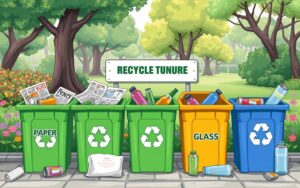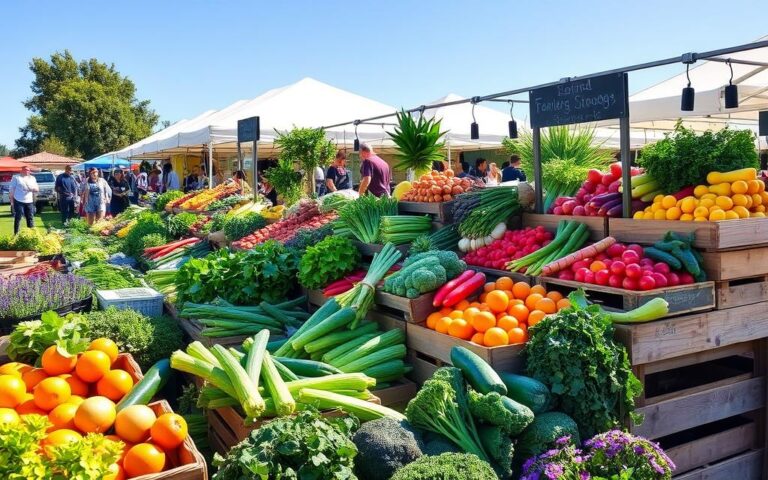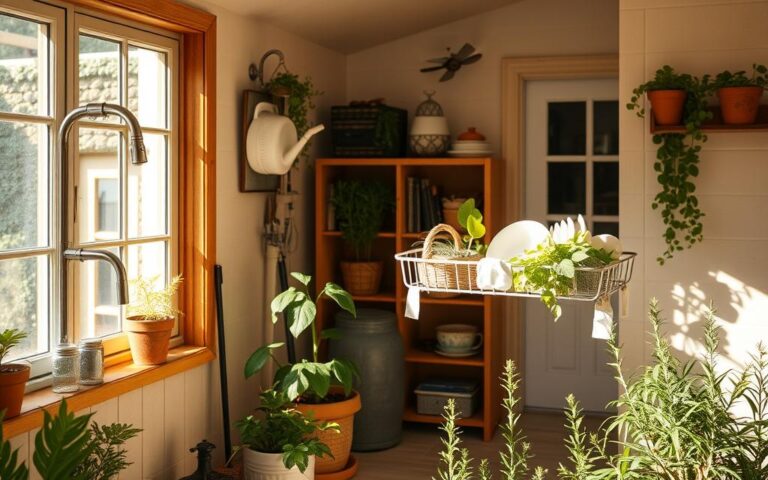Recycling is key to managing waste well. Yet, many of us don’t do it right. This introduction highlights the usual errors that hurt our recycling efforts. It stresses why following the right recycling guidelines is crucial.
By knowing these mistakes, we can recycle better. This helps our environment stay clean and healthy. Keep reading for important tips to make your recycling effective and meaningful.

Understanding the Basics of Recycling
Recycling is key for sustainability. It’s based on the principles of reduce, reuse, and recycle. These principles are crucial in handling waste responsibly.
To recycle right, knowing which materials are accepted is important. Usual items are:
- Paper and cardboard
- Plastics (specific types)
- Metals like aluminum and tin
- Glass containers
Recycling works through curbside recycling and drop-off centers. Curbside recycling picks up your items. Drop-off centers let you take items to specific spots. It’s important to follow your local rules. This helps prevent mistakes in the recycling process.
Understanding recycling words is useful for doing it better. Some key terms to know are:
| Term | Definition |
|---|---|
| Recycle | Turning waste into something usable again. |
| Composting | Breaking down organic waste into soil that’s rich in nutrients. |
| Contamination | When non-recyclables mix with recyclables, lowering the quality of recycling. |
Knowing these ideas and following the right rules can help make the environment better through recycling.
Why Recycling is Important for the Environment
Recycling plays a critical role in keeping our planet healthy. It helps save natural resources and cuts the need for raw materials. This also means less energy used and less pollution.
According to the Environmental Protection Agency, recycling stopped about 186 million metric tons of carbon dioxide from getting into the air in 2013. That’s like taking millions of cars off the road!
By recycling things like paper, glass, and metals, we can keep them out of landfills. This reduces pollution and helps the planet. It’s a way to make sure we are being kind to our Earth.
Simple steps can make a big difference in recycling. Sorting recyclable items and using less single-use plastics are good starts. Each small change can have a huge impact on our planet’s health.
| Benefit | Impact on Environment |
|---|---|
| Conserves Natural Resources | Reduces the extraction of raw materials |
| Reduces Energy Consumption | Lowers greenhouse gas emissions |
| Minimizes Landfill Waste | Decreases pollution and habitat destruction |
| Promotes Sustainable Practices | Encourages responsible consumption and disposal |
By adopting these practices, we help create a better future. Recycling is our shared duty. It’s something we must all work on together.
Common Mistakes to Avoid When You Recycle
Recycling is key to living a sustainable life. Yet, many people often make simple mistakes. Knowing the right way to recycle helps us take better care of our planet.
Many think all plastics can be recycled. But, only some types are okay for curbside recycling. Always look for a recycling symbol and a number under containers to guide you.
Not cleaning recyclables is another error. Make sure to rinse out jars and bottles. Dirty items can spoil the whole recycling batch, causing it to end up in landfills.
Mixing items wrongly can also cause trouble. This mistake can break recycling machines and mess up the process. It’s important to separate materials like paper, glass, plastics, and metals.
In summary, recycling the right way avoids common pitfalls. It makes recycling programs work better. Knowing these tips can help us all protect the environment.
| Common Mistakes | Consequences | Best Practices |
|---|---|---|
| Assuming all plastics are recyclable | Increased landfill waste | Check recycling symbols before disposal |
| Not cleaning recyclables | Contamination of recyclable materials | Rinse containers before recycling |
| Poor sorting of items | Equipment damage and processing inefficiencies | Sort recyclables into distinct categories |
How to Recycle Properly: Essential Guidelines
Learning to recycle the right way is key to keeping our planet green. By recycling the right way, we make a big difference in waste management. It starts with knowing the rules of recycling in your area, as they can change from place to place.
Make sure to clean your recyclables before tossing them. Wash out any containers to stop contamination. This keeps the whole batch of recyclables from being thrown out. Keep your recyclables separate from your regular trash to help the recycling process go smoothly.
Joining local recycling efforts shows you care about the environment. Look for local programs that teach about recycling right. Taking action early shows others how important recycling is.
- Familiarize yourself with local recycling rules.
- Always clean recyclables before disposal.
- Separate recyclables from waste to prevent contamination.
- Engage with community recycling programs.
This way of doing things helps not just with recycling. It also creates good waste management practices that help us all. Get your family and friends to recycle too. This encourages a whole community to recycle responsibly.

Sorting Your Recyclables: What You Need to Know
Sorting recyclables right is key to recycling. If you recycle the right way, it helps materials get reused. Recyclables are grouped into categories, such as:
- Rigid Plastics: Bottles, containers, and hard plastic items.
- Paper Products: Cardboard, newspapers, and office paper.
- Metals: Aluminum cans and tin cans.
- Glass: Bottles and jars.
It’s smart to have separate bins for each type at home. Make sure to label them well to help everyone sort correctly. Mixing non-recyclables with recyclables can spoil the whole batch.
Boost your recycling efforts by being eco-friendly. Compost your food waste and recycle. Join local programs to get familiar with their rules and what they accept.
Eco-Friendly Recycling Practices at Home
Making your home more eco-friendly by recycling increases the impact of your efforts. By setting up specific spots for recyclables, it’s easier to stay organized and get everyone involved. Use bins with labels for paper, plastic, and metal to keep things separate and clean.
Composting is another great way to cut down on waste. You can turn leftover food into compost, which helps plants grow. Whether you have a big yard or a small apartment, you can find a composting option that works for you.
Taking part in community clean-ups or workshops can teach you a lot about recycling. It also helps build a strong community feeling. Working together with your neighbors shows a united effort to take care of our planet.
Sometimes, it’s hard to know what you can recycle and how to do it properly. If you’re not sure, look for local guides or groups that can help. They can provide the information you need to recycle better.
Check out this table for quick tips to improve how you recycle:
| Practice | Benefits |
|---|---|
| Designated Recycling Stations | Improves organization and encourages participation |
| Composting | Reduces organic waste and enriches soil |
| Community Engagement | Fosters a sense of community and shared responsibility |
| Education Resources | Overcomes barriers to recycling and increases effectiveness |
By following these tips for sustainable living, you do more than just help your household. You also make a big difference for the entire planet. Choosing to recycle the eco-friendly way starts small changes that add up to a big impact.
Sustainable Living Tips to Enhance Your Recycling Efforts
Embracing sustainable living tips can boost your recycling efforts greatly. Making choices daily for the earth’s health matters. These strategies help you dispose of things in an eco-friendly way. They also make your recycling more effective.
- Adopt a Zero-Waste Philosophy: Aim to cut down waste by thinking about your shopping and resource use. Every small effort counts.
- Utilize Reusable Products: Choose items like cloth bags, stainless steel containers, and reusable bottles over single-use plastics.
- Engage with Local Green Initiatives: Join community cleanup groups or recycling programs. Your involvement boosts local efforts and encourages taking care of the environment.
- Educate Yourself and Others: Keep up with recycling rules and spread the word to your friends and family. Together, you can make a big difference.
Putting these tips into action leads to less waste and better recycling at home. Remember, each step you take affects the bigger picture of sustainable living.
| Tip | Description |
|---|---|
| Zero-Waste Philosophy | This approach focuses on avoiding waste from the start by being mindful about what we consume. |
| Reusable Products | Choosing durable items over disposable ones reduces waste in a big way. |
| Local Green Initiatives | Getting involved in community projects boosts recycling and environmental awareness. |
| Education | Sharing what you know about recycling helps others do their part too. |
Responsible Recycling Guidelines for Businesses
Nowadays, it’s crucial for companies to follow responsible recycling rules. It’s very important for the environment and also helps the company save money. Businesses can cut down on waste and get everyone involved in saving the planet by setting up good recycling systems.
Getting your company to go green is key to creating a better work environment. Going for green certifications improves your brand’s look and shows you care. Teaching employees how to recycle properly is very important. It helps them make smarter choices and recycle more.
Companies can also make a big impact in their communities by taking part in eco-friendly projects. When businesses show they’re serious about recycling, they encourage others to do the same. This helps achieve their eco-goals and strengthens their role in helping both the community and the environment.
FAQ
What does it mean to recycle properly?
To recycle correctly, you need to follow the rules. Make sure items are clean and sorted right. This makes recycling more effective and reduces wrong items in the bin.
Why is recycling important for the environment?
Recycling saves natural resources, reduces trash in landfills, and cuts down on pollution. It’s a key part of living in a way that’s better for the Earth. Doing it helps ensure a safe planet for everyone in the future.
What are some common mistakes people make when recycling?
Some people think all plastics can be recycled, but that’s not true. Not cleaning items or ignoring local rules can mess up recycling. These mistakes can ruin the whole process.
How can I improve my recycling efforts at home?
Start by sorting your recycling well and think about composting. Getting involved in your community helps too. Small changes at home can have a big impact on our planet.
What are responsible recycling guidelines for businesses?
Businesses should focus on being green, teaching employees about recycling, and including it in their plans. This sets a good example and helps the community.
How should I sort my recyclables?
You should separate your recyclables by type: plastics, papers, metals, and glass. Sorting correctly is crucial for a smooth recycling process and to avoid contamination.
What sustainable living tips can enhance my recycling efforts?
Try living with less waste, using reusable items, and supporting local eco initiatives. These steps will boost your recycling and help the environment.




